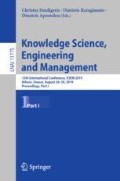Abstract
The prevalent assumption in hedonic games is that agents are interested solely on the composition of their own coalition. Moreover, agent preferences are usually assumed to be known with certainty. In our work, agents have hidden preferences over partitions. We first put forward the formal definition of hedonic games in partition function form (PFF-HGs), and extend well-studied classes of hedonic games to this setting. Then we exploit three well-known supervised learning models, linear regression, linear regression with basis function, and feed forward neural networks, in order to (approximately) extract the unknown hedonic preference relations over partitions. We conduct a systematic evaluation to compare the performance of these models on PFF-HGs; and, in the process, we develop an evaluation metric specifically designed for our problem. Our experimental results confirm the effectiveness of our work.
Access this chapter
Tax calculation will be finalised at checkout
Purchases are for personal use only
Notes
- 1.
In [1], in fact, this is mentioned as a potential extension, but it is not studied there.
- 2.
The agents assign a zero value to themselves, i.e., \(b_i^i=0\).
- 3.
Notice, that by simply changing the sum operator with \(\max \), \(\min \), or average, we can similarly express the \(\mathcal {B}-Games\), \(\mathcal {W}-Games\), and FHGs [2] in PFF, respectively.
- 4.
We remind the reader that \(\pi (j) = S\in \pi : j \in S\).
- 5.
We abusively use the term ‘social network’ to refer to a graph that give rise to personal values \(b_i^j\); without considering any related literature on the term.
References
Aziz, H., Harrenstein, P., Lang, J., Wooldridge, M.: Boolean hedonic games. In: Proceedings of the Fifteenth International Conference on Principles of Knowledge Representation and Reasoning, KR 2016, pp. 166–175. AAAI Press (2016)
Aziz, H., Savani, R., Moulin, H.: Hedonic games. In: Brandt, F., Conitzer, V., Endriss, U., Lang, J., Procaccia, A.D. (eds.) Handbook of Computational Social Choice, pp. 356–376. Cambridge University Press, Cambridge (2016)
Ba, J., Kingma, D.: Adam: a method for stochastic optimization. In: Proceedings of the 3rd International Conference on Learning Representations (ICLR-15) (2015)
Bergstra, J., Yamins, D., Cox, D.D.: Making a science of model search: hyperparameter optimization in hundreds of dimensions for vision architectures (2013)
Bergstra, J.S., Bardenet, R., Bengio, Y., Kégl, B.: Algorithms for hyper-parameter optimization. In: Proceedings of NIPS-2011, pp. 2546–2554 (2011)
Bishop, C.M.: Pattern Recognition and Machine Learning (Information Science and Statistics). Springer, Berlin (2006)
Chalkiadakis, G., Elkind, E., Wooldridge, M.: Computational Aspects of Cooperative Game Theory (Synthesis Lectures on Artificial Inetlligence and Machine Learning), 1st edn. Morgan & Claypool Publishers, San Rafael (2011)
Elkind, E., Wooldridge, M.: Hedonic coalition nets. In: Proceedings of The 8th International Conference on Autonomous Agents and Multiagent Systems, AAMAS 2009, Vol. 1, pp. 417–424 (2009)
Georgara, A., Ntiniakou, T., Chalkiadakis, G.: Learning hedonic games via probabilistic topic modeling. In: Slavkovik, M. (ed.) EUMAS 2018. LNCS (LNAI), vol. 11450, pp. 62–76. Springer, Cham (2019). https://doi.org/10.1007/978-3-030-14174-5_5
Goodfellow, I., Bengio, Y., Courville, A.: Deep Learning. MIT Press, Cambridge (2016)
Kendall, M.: Rank Correlation Methods. Griffin, London (1948)
MacQueen, J., et al.: Some methods for classification and analysis of multivariate observations. In: Proceedings of the Fifth Berkeley Symposium on Mathematical Statistics and Probability, Oakland, CA, USA, vol. 1, pp. 281–297 (1967)
Ruder, S.: An overview of gradient descent optimization algorithms (2016)
Saad, W., Han, Z., Zheng, R., Hjorungnes, A., Basar, T., Poor, H.V.: Coalitional games in partition form for joint spectrum sensing and access in cognitive radio networks. IEEE J. Sel. Top. Signal Process. 6, 195–209 (2012)
Sliwinski, J., Zick, Y.: Learning hedonic games. In: Proceedings of the 26th IJCAI-17, pp. 2730–2736 (2017)
Thrall, R.M., Lucas, W.F.: N-person games in partition function form. Naval Res. Logist. Quart. 10(1), 281–298 (1963)
Author information
Authors and Affiliations
Corresponding author
Editor information
Editors and Affiliations
Rights and permissions
Copyright information
© 2019 Springer Nature Switzerland AG
About this paper
Cite this paper
Georgara, A., Troullinos, D., Chalkiadakis, G. (2019). Extracting Hidden Preferences over Partitions in Hedonic Cooperative Games. In: Douligeris, C., Karagiannis, D., Apostolou, D. (eds) Knowledge Science, Engineering and Management. KSEM 2019. Lecture Notes in Computer Science(), vol 11775. Springer, Cham. https://doi.org/10.1007/978-3-030-29551-6_73
Download citation
DOI: https://doi.org/10.1007/978-3-030-29551-6_73
Published:
Publisher Name: Springer, Cham
Print ISBN: 978-3-030-29550-9
Online ISBN: 978-3-030-29551-6
eBook Packages: Computer ScienceComputer Science (R0)

